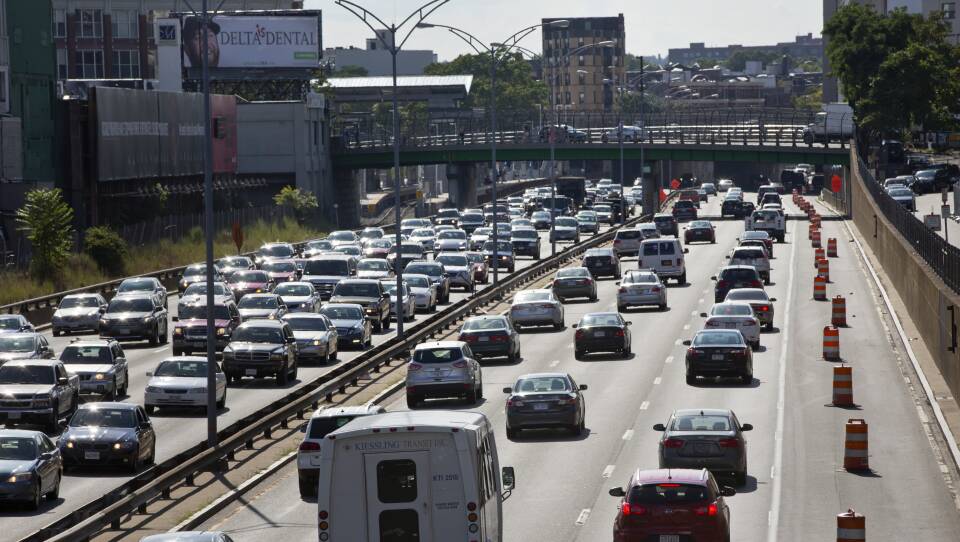Boston is the country's most gridlocked city, according to a new annual Global Traffic Scorecard that was released today by the National Transportation data firm Inrix. According to the scorecard, the average driver in Greater Boston spends 164 hours stuck in traffic per year. That's enough hours to drive across the country from Maine to Washington State three times, with a handful of hours to spare.
Chris Dempsey is director of a group called Transportation for Massachusetts, a coalition of organizations working to improve transportation in the commonwealth. Dempsey spoke with WGBH All Things Considered anchor Barbara Howard about that new report. This transcript has been edited for clarity.
Barbara Howard: Well that's a whole lot of hours, 164 hours. And time, of course, is money. So spending time stuck in traffic is costly. Can you quantify it for us?
Chris Dempsey: Well Inrix estimates that it's over $2,200 dollars every year for every driver. So if you're a household that has two drivers you're wasting something like $350 or $400 dollars a month just sitting in congestion per year.
Howard: This current data is from 2018, but the year before that, Boston was not at the top. It was ranked No. 7. But the methodology was changed and that shot Boston to the top of the list — what happened?
Dempsey: Inrix this year is focusing on those prime commute times, those rush hour periods when congestion is especially bad. On that ranking, we are No. 1 in the entire country.
Howard: Boston is now top of the list, followed by Washington D.C., Seattle, Chicago, New York and Los Angeles. Is there anything to be learned from any of those other cities? Are they doing anything right?
Dempsey: One thing that those other cities are doing is they're using pricing as a tool. They're offering discounts to drivers to drive at off-peak periods, and Greater Boston is the only one of the country's 10 largest cities that does not use that tool.
Howard: Through tolling?
Dempsey: Yes, so they just take their tolling systems and they say, 'Look, we're going to give you a discount for driving off-peak.' It's something that MassDOT so far has been very reluctant to do, and we're hoping that a report like today's is going to really cause them to say, 'It's time for us to do something different.'
Read more: Costs Of Traffic Congestion Highest In Boston, Report Says
Howard: The other cities, I imagine, have better mass transit. Ours is pretty ancient, we struggle with our mass transit here.
Dempsey: Well look, it's definitely a challenge, and I ride the T every day so I appreciate that it's a system that needs to be working better. But no city has a perfect transit system, certainly not in the United States. And what this is about is saying, 'Let's give people more and better options, including getting their buses moving faster.' One third of MBTA riders are on buses and they're stuck in that same congestion that drivers are stuck in.
Howard: Also bicycles are a big part of the Boston infrastructure these days, or at least trying to be. Is that moving fast enough for you?
Dempsey: We'd like to see that move faster, and this is a place where Boston's narrow streets and density is actually a big advantage. There's a lot of trips that are between maybe one and three miles, which are a good distance for some people that want to cycle. That's not going to be an option for everyone. But if it takes the car off the road, then it's still good for drivers.
Howard: Is it fair to compare Boston to cities like Los Angeles? Boston is a very tight, congested, old city with literally smaller, narrower roads than a place like Los Angeles, which is so sprawling. They’re apples and oranges, aren't they?
Dempsey: Well maybe they are, but I think if you look at places like Seattle and Minneapolis that are more pure cities, and both have added jobs in their downtown core while actually reducing the number of people that are driving downtown and they're doing a better job of fixing this problem.
Howard: Concretely, what kinds of things are they putting in place to manage that?
Dempsey: Seattle is spending over $50 billion to build out its light rail system, trying to compete with cities like Boston that have the Green Line. Minneapolis is doing the same. They're also giving priority to buses on their streets so that they can move people more efficiently.
Howard: But we are doing some of that. We're seeing some bus dedicated lanes and we're certainly trying to upgrade the MBTA, both the subway and the buses. You're saying not enough?
Dempsey: I think not enough and not fast enough. We want to see more of that activity. We want to see those pilots expanded into permanent installations and we want to see them expanded in terms of the time of day that those bus lines operate.
Howard: Boston always likes to see itself as a world-class city. Do we stand the risk of falling behind other mid-sized cities if we don't get on the ball about this sort of thing?
Dempsey: Absolutely, I think transportation is hurting our quality of life. We would be a much more vibrant place, a much more equitable place, if we could solve this problem. We need to be proactive about taking it on and addressing it head on.
Howard: That's Chris Dempsey, director of a group called Transportation for Massachusetts, a coalition of organizations working to improve transportation here in the Commonwealth. A new report out today ranks Boston as the worst city for traffic congestion in the country.




